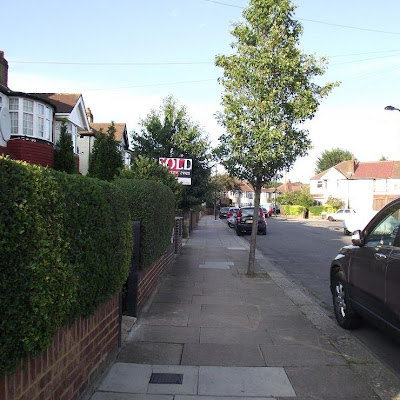 One evening in February I was on my way home from work when I saw a group of people heading towards me.
One evening in February I was on my way home from work when I saw a group of people heading towards me.
Faced with potential danger I behave as though I am 6' tall rather than the 5'3" I actually reach and my fantasy Dobermans are panting at my side, giving an outward show of respect to those involved unless the mood changes. I do not speed up and sometimes even slow down but without hesitating or giving ground. In this way I moved through a group of young males, ranging in age from late teens to a couple who could not have been older than eight years old. That shocked me and I risked looking at them as I passed. It was cold, dark and past 8pm on a week day. I wondered if their parents knew where they were or even cared. They certainly weren't dressed for the weather.
"Am I goin' to hear a smash, Ash?!" one of them called out, as they swarmed around a bus shelter. But it was left unscathed as they moved up the street like a shoal of fish, suburban piranhas. It occurred to me that, in their own way, the older members of that group were caring for the youngest and however much I disapproved of their method, they were filling the gap left by parents, often mothers, unwilling or unable to handle the children they have bred.
Six months later I can remember the sudden urge I had to take them all home, to scrape enough money together for a pizza - to share if not to nourish - and be mother. That pang was a strange and unfamiliar feeling, I am not the maternal type, but for a few moments I felt their need so deeply that it made a dent in the cynical shell that protects me from daft notions like that. I suspect that I am on my own with this sense of concern, especially after recent events.
The rioting, looting mobs that filled our screens for two days have led to all the usual calls for greater parental discipline, harsher police tactics and support for deprived areas. I find that I am tired of hearing them, probably because I've heard it all before so many times. Perhaps I am old enough now to recognise that there is no single solution, that any effective repair to the confidence of business owners and residents will be haphazard and largely accidental. There seems to be a growing acceptance that it will take a change in mindset rather than funding to fix things and it is tragic that it has taken so long for this to sink in.
Many are shocked, as I was, that children whose ages must be in single figures were not safe in their homes, watching the chaos on television. Instead they were wandering through the debris of ruined shops, following the example of their older friends and taking the leftovers. Some were even treated as porters, their innocent arms filled with loot by adults too stupid to realise that every move was being recorded on CCTV.
Loving parents who hang on each childish word, lavish time on home cooked meals and lose sleep over unsatisfactory school reports might as well be from another planet to those who raised these tiny looters. My lip used to curl at the mere thought of the selfish lazy creatures who have helped shape our future citizens but scorn has been replaced by a sense of fear that there are so many of them.
 A former colleague became pregnant at sixteen by a man whose lack of interest in his son was a regular topic of our largely one sided conversations. I became a near expert on her son’s failings, including his own poor record as a father. Having set the example for his spending habits through her own need for instant gratification she spent hours on her phone berating him about it. Last year I was trapped in a waiting room with several others listening to another woman’s very similar, loud conversations, full of "I" and "me", on her mobile as she described at some length the hard time she was having.
A former colleague became pregnant at sixteen by a man whose lack of interest in his son was a regular topic of our largely one sided conversations. I became a near expert on her son’s failings, including his own poor record as a father. Having set the example for his spending habits through her own need for instant gratification she spent hours on her phone berating him about it. Last year I was trapped in a waiting room with several others listening to another woman’s very similar, loud conversations, full of "I" and "me", on her mobile as she described at some length the hard time she was having.
The call that left the greatest impression on me was the one she made to her son. She complained that he wasn't with her, that he had spent the weekend "smoking", that he had failed in every way imaginable, yet when she ended the call and looked around at us she smiled, satisfied that she had such an audience for her woes, oblivious to our vinegary contempt. What a martyr. I could imagine the teenager on the other end, for whom humiliation by stranger was probably a common event, switching off for its duration, almost but never quite numb to the sarcasm pouring from her lips.
I was an adult before mobiles became common but my mother bitched about me to other people, in front of me, in the same selfish cathartic way and I admit that a degree of fellow feeling helps me overlook his use of cannabis. My mother's constant sarcasm cut deep and had a long term, negative impact so I wonder how anyone who does not have enough self confidence to know that they are good at some things could cope under such a negative barrage. Teachers report that very young children now begin school unable to recognise and respond to their own names because their carers rarely speak directly to them except to shout, too busy putting the world to rights on their phones.
To me it is no coincidence that terms such as “bruv” and “bro” are used by young men. When the people that society expects us to respect first and most, our parents, do nothing to deserve it, it is hardly surprising that a peer group or gang becomes the most readily available substitute family. If the dominant woman in your life treats you with contempt whilst behaving in a contemptible manner it is unlikely that you will regard others of her gender as people you want to commit to for life. It becomes inevitable that those who these children choose to prove themselves to are friends who really will follow through, with a beating or even a knife, if they fail to deliver, will teach them shame and pride in a way that their parents never could. It is the closest that many will get to the even handed discipline we all have a right to.
Do not mistake my words for a rant about single mothers because parents become “single“ for all sorts of reasons. An elderly neighbour never tired of telling me of the beloved gentle woman, a war widow, who raised her by herself with very little financial assistance from the government in a way that set a positive pattern for three more generations. The women who typify the modern negative stereotype of the "single mother" are now grandmothers to children who may well turn out just like their parents, raised in the 1980's when conspicuous consumption was a near religion, a measure of self worth.
This is not just about the benefits culture. I point a steady and unforgiving finger at parents who were so keen to achieve their career goals that they replaced love, affection and a guiding hand with all the material goods their earnings could buy. Is it any surprise then, that their children fill the gap left by a lack of nurturing with stuff they don't need when they need stuff they don't want, like education and jobs? To them, greed is still good. As their offspring hurt themselves kicking in shop windows, bleeding on pavements across the UK, the cry went up: “Where are their parents?!” They were watching them in HD, on televisions they may have actually paid for.
Am I the only one to see the irony in the appeal made by David Lammy MP to network providers to shut down the SMS system through which many of these riots seem to have been organised? Thefts were being carried out by those who can afford a Blackberry, using communications that earlier this year were seen as essential to the success of the Arab Spring. To some these looters are revolutionary heroes. The rioters have been characterised as disaffected youths from underprivileged backgrounds but it was predictable that those already convicted include a number who do not lack for money. The emotional famine that their entire peer group, rich and poor, has suffered for a generation or more is only now becoming apparent. Unfortunately the remedy for this sickness is something that money can’t buy.







































